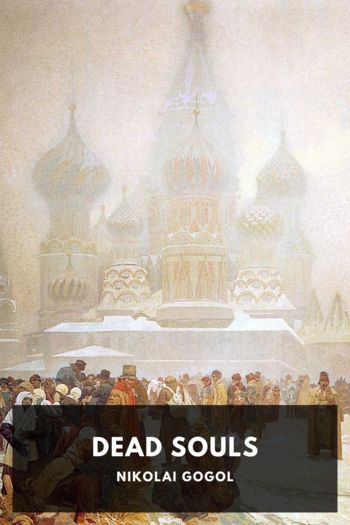Short Fiction - Nikolai Gogol (best selling autobiographies TXT) 📗

- Author: Nikolai Gogol
Book online «Short Fiction - Nikolai Gogol (best selling autobiographies TXT) 📗». Author Nikolai Gogol
Choop opened wide his eyes as he saw the blacksmith enter his room. He knew not at what most to marvel, whether at the blacksmith being once more alive, or at his having ventured to come into his house, or at his being dressed so finely, like a Zaporoghian; but he was still more astonished when he saw Vakoola undo his handkerchief, and set before him an entirely new cap, and such a belt as had never before been seen in the village; and when Vakoola fell at his knees, saying in a deprecating voice: “Father, have mercy on me! do not be angry with me! There, take this scourge, whip me as much as thou wilt! I give myself up. I acknowledge all my trespasses. Whip me, but put away thine anger! The more so that thou and my late father were like two brothers, and shared bread, and salt, and brandy together.”
Choop could not help feeling inwardly pleased at seeing at his feet the blacksmith, the very same blacksmith who would not concede a step to anyone in the village, and who bent copper coins between his fingers, as if they were so many buckwheat fritters. To make himself still more important, Choop took the scourge, gave three strokes with it upon the blacksmith’s back, and then said: “Well, that will do! Stand up! Attend to men older than thyself. I forget all that has taken place between us. Now, speak out, what dost thou want?”
“Father, let me have Oxana!”
Choop remained thinking for a while; he looked at the cap—he looked at the belt; the cap was beautiful—the belt not less so; he remembered the bad faith of Solokha, and said, in a resolute voice, “Well, send me thy marriage brokers.”
“Ah!” shrieked Oxana, stepping across the threshold; and she stared at him, with a look of joy and astonishment.
“Look at the boots I have brought thee!” said Vakoola; “they are the very boots which the Czarina wears.”
“No, no, I do not want the boots!” said Oxana, and she waved her hands, never taking her eyes off him; “it will do without the boots.” She could speak no more, and her face turned all crimson.
The blacksmith came nearer, and took her hand. The belle cast down her eyes. Never yet had she been so marvellously handsome; the exulting blacksmith gently stole a kiss, and her face flushed still redder, and she looked still prettier.
As the late archbishop happened to pass on a journey through Dikanka, he greatly commended the spot on which that village stands, and driving down the street, stopped his carriage before a new cottage. “Whose cottage is this, so highly painted?” asked his Eminence of a handsome woman who was standing before the gate, with an infant in her arms.
“It is the blacksmith Vakoola’s cottage!” answered Oxana, for she it was, making him a deep curtesy.
“Very good painting, indeed! Capital painting!” said the Right Eminent, looking at the door and the windows. And, in truth, every window was surrounded by a stripe of red paint; and the door was painted all over with Cossacks on horseback, with pipes in their mouths. But the archbishop bestowed still more praises on Vakoola, when he was made acquainted with the blacksmith’s having performed public penance, and with his having painted, at his own expense, the whole of the church choir, green, with red flowers running over it. But Vakoola had done still more: he had painted the devil in hell, upon the wall which is to your left when you step into the church. This devil had such an odious face that no one could refrain from spitting, as they passed by. The women, as soon as their children began to cry, brought them to this picture and said, “Look! is he not an odious creature?” and the children stopped their tears, looked sideways at the picture, and clung more closely to their mother’s bosom.
Old-Fashioned FarmersI am very fond of the modest life of those isolated owners of distant villages, which are usually called “old-fashioned” in Little Russia,27 and which, like ruinous and picturesque houses, are beautiful through their simplicity and complete contrast to a new, regular building, whose walls the rain has never yet washed, whose roof is not yet covered with mould, and whose porch, undeprived of its stucco, does not yet show its red bricks. I love sometimes to enter for a moment the sphere of this unusually isolated life, where no wish flies beyond the palings surrounding the little yard, beyond the hedge of the garden filled with apples and plums, beyond the izbás of the village surrounding it, having on one side, shaded by willows, elder-bushes and pear-trees. The life of the modest owners is so quiet, so quiet, that you forget yourself for a moment, and think that the passions, wishes, and the uneasy offspring of the Evil One, which keep the world in an uproar, do not exist at





Comments (0)